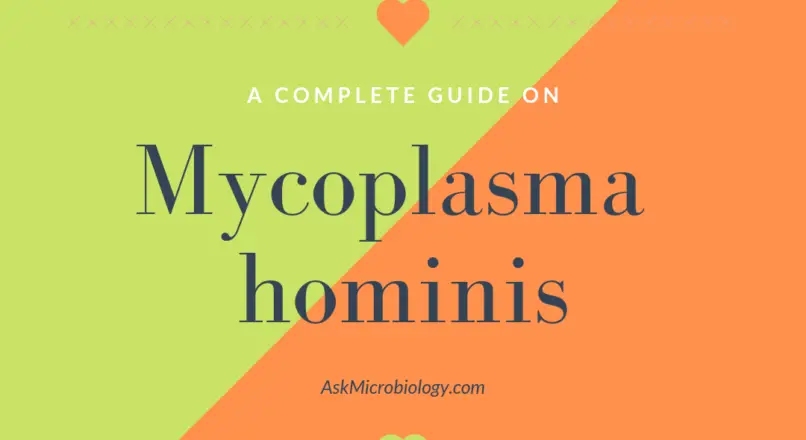
Mycoplasma hominis
Introduction
Mycoplasma hominis are obligate parasites. They are dependent on external cholesterol source for the synthesis of their plasma membrane. So they need their host for the synthesis of plasma membrane and growth. They are dependent on host for getting most of their compounds. They require especial growth requirements and hence special media for their growth. 5 to 10 % of Carbon dioxide is required for their growth. Mycoplasma hominis can grow on glucose agar medium giving fried egg colonies within 24 to 48 hours. It’s energy metabolism is dependent on arginine degradation while other mycoplasmas don’t have this characteristics.
History
The first Mycoplasma hominis was mainly involved in causing pelvic inflammatory disease. Mycoplasma hominis recovery from human was done directly in 1937 from a pathological condition. It was discovered from an abscess of Bartholin’s gland. After that its isolation and identification was made.
Taxonomy
Mycoplasma hominis is an important pathogen of humans and is only present in humans. Its classification is as follows;
| Classification of Mycoplasma hominis | |
| Kingdom | Bacteria |
| Phylum | Tenericutes |
| Class | Mollicutes |
| Order | Mycoplasmatales |
| Family | Mycoplasmataceae |
| Genus | Mycoplasma |
| Specie | Mycoplasma hominis |
| Binomial Name: Mycoplasma hominis | |
Diseases
Mycoplasma hominis colonize the urogenital tract. It is involved in reproductive system diseases and is more frequent in females than males. It causes pelvic inflammatory disease (PID) and also involved in bacterial vaginosis. These diseases are not caused actually by Mycoplasma hominis only but a group of microbes is involved in causing these diseases. Mycoplasma hominis has secondary role in causing these diseases. Mycoplasma hominis is also involved in causing infertility in males. It is also involved in causing pyelonephritis.
Transmission
Mycoplasma hominis is present in the urogenital tract of half of the females and fewer males. They are opportunistic pathogens. It can be transmit from mother to offspring during childbirth. It can also be transmit from one partner to other during sexual intercourse. If one partner is suffering with the disease it can transmit to other partner during sexual intercourse. Its transmission is more like the transmission of STDs.
Pathology
Mycoplasma hominis attach to the ciliated and non ciliated epithelium of urogenital tract. Mycoplasma hominis has certain adherence antigenic molecules which help it in cytoadherence. Main adhesion protein is P1 which attaches to sialoglycolipids and sialoglycoproteins receptors present on epithelium of urogenital tract. It produces hydrogen peroxide which causes cell damage. There is immune response at sight of infection and inflammation occurs. In bacterial vaginosis due to high pH the number of Mycoplasma hominis also increases.
Signs and Symptoms
Mycoplasma hominis infection has symptoms similar to STDs. There are no typical signs and symptoms. It depends upon the disease caused by Mycoplasma hominis.
- Urethral discharge in males
- Vaginal discharge in females
- Irritation
- Patients may have discomfort while ejaculation.
- In pelvic inflammatory disease there is a pain in lower abdomen and pelvic region.
- Signs and Symptoms resemble to sexually transmitted diseases
Further complications
Mycoplasma hominis is mainly involved in causing Pelvic inflammatory disease and pyelonephritis but it can cause following complications too.
- Cystitis
- Endometritis
- Wound infections that can be bith surgical or non surgical.
- Bacteremia
- Meningitis
- Salpingitis
- Cervicitis
- Urethritis
- Septic arthritis
- Mycoplasma hominis is also involved in causing meningoencephalitis and neonatal sepsis in neonates. It is also associated in causing chorioamnionits and even miscarriage.
It is also present in polymicrobial infections. It has a strong association with Ureaplasma urealyticum. Both can be present in pregnant female and can be transferred to offspring.
Risk factors
Mycoplasma hominis is mostly present in urogenital tract of most of females and rarely in males. It is an opportunistic pathogen and a normal inhabitant in most of females. Mycoplasma hominis requires other diseases for causing disease. Mycoplasma hominis alone usually cannot produce disease as it requires certain predisposing factors for causing disease. It causes disease mostly in people whose immunity is less due a certain disease like AIDs. So mostly it causes disease in immunocompromised people. It plays secondary role in causing diseases and is involved in polymicrobial diseases.
Diagnosis
Mycoplasma hominis can be diagnosed by using culturing method. It gives fried egg colonies on glucose agar medium. vaginal or urethral fluid or its swab is taken as a sample for culturing and diagnostic purposes. PCR is available for Mycoplasma hominis but it is available very less on commercial scale. It can also be diagnosed by using serological testing.
Treatment
Antibiotic treatment is done for Mycoplasma hominis. There is an association between Ureaplasma and Mycoplasma hominis in causing disease. The drug of choice is for Mycoplasma hominis is Doxycycline. Clindamycin and fluoroquinolones can also be used as an alternative but Clindamycin is not effective against Ureaplasma.
Prevention
It can be prevented by adapting following preventive measures:
- Use of protection during sex and avoid having multiple sex partners.
- Seeking proper medical attention when you observe any sign or symptom of sexually transmitted disease. Consult your doctor immediately.
- Consult your doctor and seek proper medical care if your partner is having STD.
- Avoid any unhygienic vaginal activities especial care is needed after any gynecological procedure or surgery.
- Have a proper knowledge and awareness about STDs.
- There is no available vaccine for Mycoplasma hominis.
Leave a reply